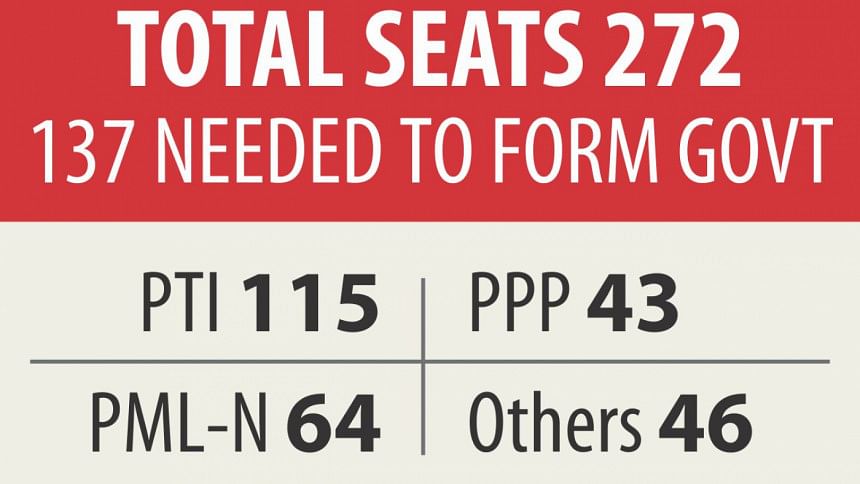Pakistan Elections: Main parties reject results

Pakistan's main parties rejected the outcome of elections won by Imran Khan and announced protests demanding new polls yesterday, after the pivotal vote was criticised by foreign observers over allegations of rigging.
The announcement by the All Parties Conference (APC), including the outgoing Pakistan Muslim League-Nawaz (PML-N), is a fresh obstacle to power for Khan on a day when delayed results finally showed he had won an emphatic victory -- though he will need to seek a coalition to form a government.
The nationwide election held on Wednesday has been criticised by the European Union and other observers after widespread claims that the powerful military was trying to fix the playing field in Khan's favour.
It had been dubbed "Pakistan's dirtiest election" but for now Khan's victory represents an end to decades of rotating leadership between the PML-N and the Pakistan Peoples Party (PPP) that was punctuated by periods of military rule.
The PML-N and other parties have alleged "blatant" rigging over the vote count.
"We think a robbery has been committed," Maulana Fazalur Rehman, head of the religious Jamiat Ulema-e-Islam (JUI-F) party, told reporters late yesterday.
"We will run a movement for the holding of elections again. There will be protests... We will not allow democracy to be taken hostage by the establishment," he said, using a word widely understood in Pakistan to mean the military.
The PML-N, which claims it was the target of the military manipulation, said it would join in the protests although no date was immediately announced.
"I fully agree with it. The worst kind of irregularities have been committed, which are unprecedented," party leader Shahbaz Sharif said.
However Sharif said he would need to consult with his party's leadership over a decision by the APC not to take the oath swearing in members of parliament.
The Pakistan Peoples Party (PPP), which has won the third largest number of seats in the vote, was notably absent from the APC.
In a later press conference, PPP chairman Bilawal Bhutto Zardari said his party also rejected the election results, but vowed it would try to convince the other parties to participate in the parliamentary process.
The vote was meant to be a rare democratic transition in the Muslim country, which has been ruled by the powerful army for roughly half its history.
But it was marred by violence and allegations of military interference in the months leading up to the vote, with Khan seen as the beneficiary.
The EU Election Observation Mission to Pakistan's chief Michael Gahler told reporters in Islamabad that "a number of violent attacks, targeting political parties, party leaders, candidates and election officials, severely affected the campaign environment".
"Many of our interlocutors acknowledged a systematic effort to undermine the former ruling party through cases of corruption, contempt of court and terrorist charges against its leaders and candidates," he continued.
The Election Commission (ECP) yesterday said that with only a handful of seats left to count, Khan's Pakistan Tehreek-e-Insaf (PTI) enjoys a strong lead with 115 seats, and will be the biggest party in parliament.
The PML-N is a distant second, leading on 64 seats, while the PPP has won 43. The Muttahida Majlis-i-Amal (MMA) ─ an alliance of multiple religious parties ─ has managed to secure just 13 seats.
Independent candidates have won 12 spots in the National Assembly, while the MQM-P has six seats to its name. The PML-Q, meanwhile, has won four seats, and the Balochistan National Party (BNP) and Grand Democratic Alliance (GDA) have grabbed two seats each.
But the count indicates PTI will not achieve the 137 seats needed in the National Assembly to form a majority government.
Analysts had long predicted that if Khan took power it would have to be via coalition -- but the size of his lead still took many by surprise.
Analyst Ayesha Siddiqa said observers may have underestimated the depth of feeling among Pakistan's growing middle class.
"Remember they grew up on this narrative of a corrupt Pakistan being damaged and needing a new leadership... In all this hue and cry, we didn't notice there is another Pakistan there that wanted this change," she told AFP.
Khan campaigned on promises to end widespread graft while building an "Islamic welfare state".
Now the former World Cup cricket champion will have to partner with independents and smaller parties, a task analysts said should be straightforward.
"The independents know that the establishment is inclined toward Imran Khan," retired general and analyst Talat Masood told AFP.
Khan claimed victory in a wide-ranging address to the nation Thursday.
He vowed to tackle corruption and touched on promises to balance relations with the US, while saying he was open to discussions with arch-rival India including over the disputed Himalayan territory of Kashmir.
Khan will face myriad challenges including militant extremism, an economic crisis with speculation that Pakistan will have to seek a bailout from the International Monetary Fund, water shortages, and a booming population, among others.
He will also have to contend with the same issue as many of his predecessors: how to maintain a balance of power in civil-military relations.
In the West, Khan is typically seen through the prism of his celebrity and high-profile romances, but at home he cuts a more conservative persona as a devout Muslim who believes feminism has degraded motherhood.
Known in Pakistan as "Taliban Khan" for his calls to hold talks with insurgents, he increasingly catered to religious hardliners during the campaign, spurring fears his leadership could embolden extremists.

 For all latest news, follow The Daily Star's Google News channel.
For all latest news, follow The Daily Star's Google News channel. 



Comments